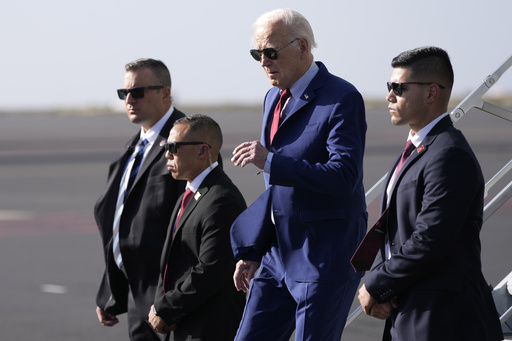
ATLANTA — In the wake of recent electoral defeats, Democrats are now facing the fallout from President Joe Biden’s decision to pardon his son for federal offenses. The party, which has long characterized Donald Trump as a serious threat to democratic principles and the rule of law, finds itself in a complicated position following this clemency act.
Late Sunday, Biden issued a pardon for Hunter Biden, negating previous commitments to uphold the law in the face of his son’s actions. This grant of clemency extends over a decade and covers various federal crimes that Hunter might have committed. The 82-year-old president declared that the charges against his son—specifically those relating to tax evasion and the falsification of a federal firearm purchase form—were motivated by political agendas.
This justification has not appeased many within the Democratic party, who express frustration over the implications of Biden’s decision. Critics argue that this reversal may undermine efforts to hold Trump accountable for his own legal troubles. Trump has maintained that his various indictments and a single conviction are the result of the Biden administration weaponizing the justice system against him.
Colorado’s Governor Jared Polis voiced his concerns on social media, suggesting that Biden’s actions could set a dangerous precedent for future leaders. He emphasized the notion that while one can empathize with Hunter’s challenges, accountability must prevail, asserting that no individual, regardless of their relationship to the president, is above the law.
Representative Greg Stanton of Arizona also criticized the move, underscoring that Hunter Biden’s prosecution was not politically motivated, as he had been convicted by a jury for committing felonies.
Despite the backlash, some Democratic allies defend Biden’s pardon by pointing to Trump’s own history of granting pardons to his associates and friends, several of whom were implicated in misconduct during Trump’s presidency.
Prominent Democratic fundraiser Jon Cooper highlighted this inconsistency by recalling Trump’s pardons of figures such as Roger Stone and Michael Flynn. He ultimately concluded that Biden acted rightly in protecting Hunter against what he described as a politically charged initiative from Trump’s allies.
Looking ahead, Democrats are wary of a potential Republican resurgence, which may involve Trump reclaiming the presidency and the GOP gaining control of both chambers of Congress. As they prepare their strategy, they plan to emphasize that an incoming Trump administration would breach democratic norms by pursuing vendettas against political opponents.
The backdrop to the current events includes Trump’s own legal challenges, which originated from attempts to contest the results of the 2020 election. Following his victory on November 5, many of those cases relating to Trump’s past activities have faced significant delays or dismissals.
Biden had previously laid out a clear stance against pardoning his son, asserting earlier this year that he would respect the jury’s decision in Hunter’s legal case. Notably, just days prior to Trump’s electoral victory, White House Press Secretary Karine Jean-Pierre reiterated that a pardon was not on the table.
The president’s change of heart arrived as Hunter was nearing sentencing after his recent conviction regarding gun-related offenses and tax issues. Hunter’s legal troubles have spanned several years, first revealed when he disclosed an ongoing federal investigation in December 2020.
The extensive pardon issued by Biden encompasses not only Hunter’s recent convictions but also any potential offenses committed from January 1, 2014, to December 1, 2024. In June, Hunter was found guilty in Delaware of three felony counts connected to a firearms purchase, where he had lied on a federal application about his drug use. He was also facing trials related to tax charges amounting to over $1.4 million before opting for a guilty plea.
In his announcement, Biden argued that the scrutiny faced by Hunter Biden in these cases is unusual and primarily a result of political maneuvering against him. He contended that Hunter’s case was unique and highlighted that these charges seemed to have been prompted more by political rivalry than by standard legal protocols, emphasizing the personal nature of his decision as both a father and a president.
